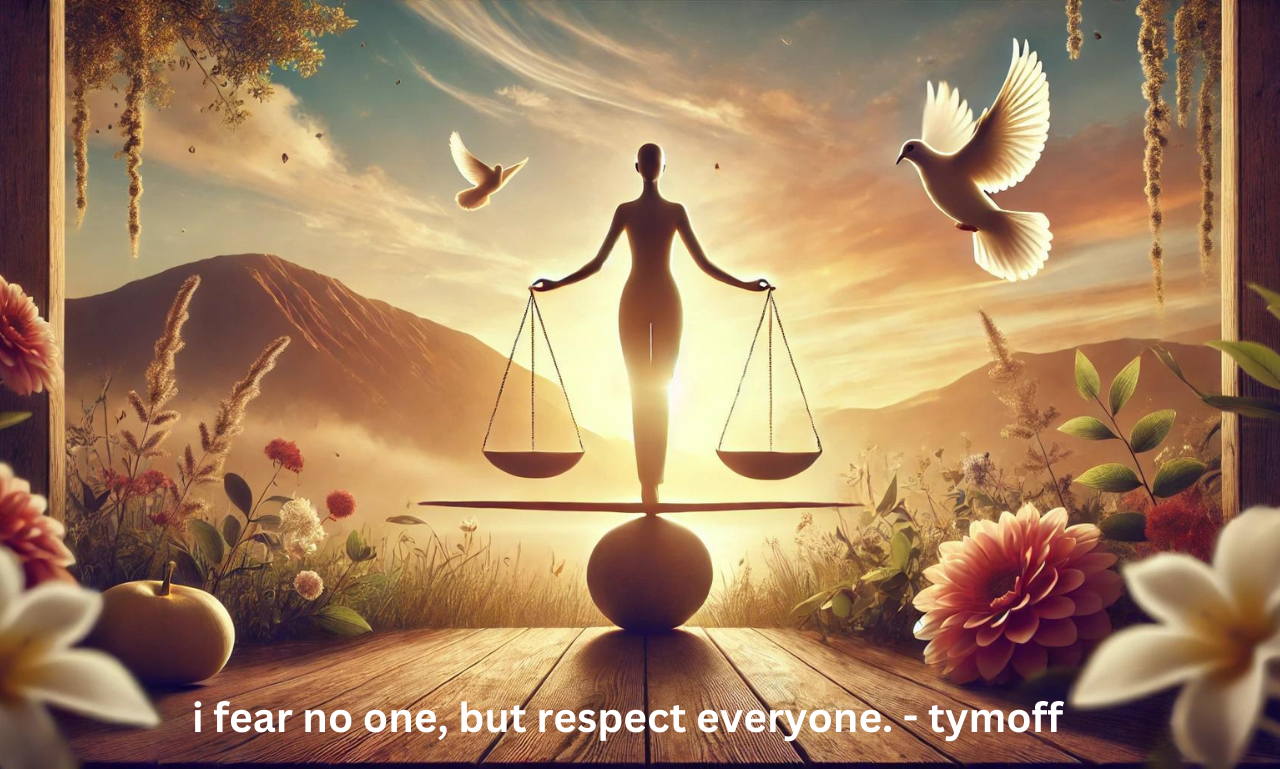Table of Contents
In life, one of the most valuable lessons we can learn is how to balance fear and respect. The quote, “I fear no one, but respect everyone. – Tymoff,” captures this delicate balance perfectly. It speaks to the importance of self-confidence while maintaining humility and recognizing the value in others. But what exactly does this quote mean, and how can it apply to our everyday lives? Let’s break it down.
Understanding the Essence of the Quote
When Tymoff says, “I fear no one,” it’s a powerful declaration of self-assurance. Fear, particularly fear of others, can hold us back in numerous ways. Whether it’s fear of failure, fear of judgment, or fear of confrontation, it can often paralyze us, keeping us from achieving our full potential. Tymoff’s message is clear: don’t let fear dominate your life. However, this is not to suggest arrogance or superiority; rather, it’s about being secure in oneself, free from the constraints that fear can impose.
On the other hand, the second part of the quote, “but respect everyone,” reminds us that confidence should always be coupled with respect. Respect for others is foundational to building positive relationships, fostering cooperation, and contributing to a harmonious society. Respect doesn’t mean being submissive or compromising your values; it means acknowledging the worth of others, even when you disagree with them.
Fear vs. Respect: What’s the Difference?
Fear and respect are often confused, but they are fundamentally different. Fear is rooted in a sense of threat—when we fear someone, we feel they can harm us, whether physically, emotionally, or socially. Respect, however, stems from admiration or recognition of someone’s abilities, qualities, or position. While fear can lead to avoidance or aggression, respect fosters understanding, cooperation, and mutual benefit.
Living by the mantra “I fear no one, but respect everyone” encourages a life of balance. It’s about not allowing fear to govern your decisions while ensuring that respect for others remains at the forefront of your interactions. This mindset can significantly impact how you approach various aspects of life, from personal relationships to professional settings.
Applying the Quote in Daily Life

1. In Personal Relationships
In your personal life, embracing the philosophy of not fearing but respecting others can transform how you interact with friends, family, and even strangers. When you eliminate fear from your relationships, you open the door to honest communication and deeper connections. For example, if you fear conflict with a friend, you may avoid necessary conversations, leading to unresolved issues and resentment. But if you approach the situation with respect, acknowledging the other person’s feelings and perspectives, you can navigate conflicts constructively, leading to stronger, more resilient relationships.
Respect also plays a crucial role in ensuring that relationships remain healthy and balanced. Respecting others means valuing their opinions, boundaries, and individuality, even when they differ from your own. By doing this, you foster trust and mutual understanding, the pillars of any successful relationship.
2. In the Workplace
In professional environments, fear can be a significant barrier to success. Whether it’s fear of making mistakes, fear of your boss, or fear of competition, these emotions can stifle creativity, innovation, and productivity. Adopting the “I fear no one” mindset in the workplace encourages you to take calculated risks, express your ideas confidently, and approach challenges head-on.
However, respect is equally important in the professional world. Respecting your colleagues, superiors, and even your competitors can pave the way for collaboration, learning, and growth. It’s about recognizing the value that each individual brings to the table, regardless of their role or title. By respecting others in the workplace, you contribute to a positive, inclusive culture where everyone feels valued and heard.
3. In Leadership
For leaders, the balance between fearlessness and respect is critical. A leader who is fearless but lacks respect for others may come across as tyrannical or unapproachable. On the other hand, a leader who respects others but is governed by fear may struggle to make tough decisions or assert authority when necessary.
The best leaders embody the philosophy of “I fear no one, but respect everyone.” They are confident in their abilities and decisions, but they also listen to others, value diverse perspectives, and foster a culture of respect within their teams. Such leaders inspire loyalty, trust, and high performance, not through fear or intimidation, but through respect and empowerment.
The Role of Confidence

At the heart of the quote is confidence—confidence in oneself, in one’s values, and in one’s ability to navigate the complexities of life. When you fear no one, it doesn’t mean you are invincible or superior to others; rather, it signifies that you are secure in who you are. This kind of confidence allows you to stand firm in your beliefs, pursue your goals with determination, and face challenges without being crippled by doubt or anxiety.
However, true confidence is never about belittling or undermining others. It’s about lifting others up, recognizing their worth, and showing respect for their contributions. This balance between confidence and respect is what makes individuals truly admirable and effective in all areas of life.
Respect as a Universal Value
Respect is a universal value that transcends cultures, backgrounds, and beliefs. It is the foundation of social harmony and mutual understanding. By respecting everyone, regardless of their status, opinions, or actions, you contribute to a more inclusive and compassionate world.
Respecting others doesn’t mean agreeing with everything they say or do. It simply means recognizing their humanity and treating them with dignity. Even in moments of disagreement or conflict, maintaining respect allows for constructive dialogue and resolution. It’s about focusing on the person’s intrinsic value rather than letting differences create division.
Overcoming Fear
While Tymoff’s quote encourages fearlessness, it’s important to acknowledge that fear is a natural human emotion. Everyone experiences fear at some point in their lives—whether it’s fear of failure, rejection, or the unknown. The key is not to eliminate fear entirely, but to manage it effectively.
Overcoming fear requires a shift in mindset. Instead of allowing fear to control your actions, you can use it as a motivator for growth and self-improvement. For example, if you fear public speaking, instead of avoiding it, you can practice and gradually build your confidence. Over time, what once caused fear will become an opportunity for personal development.
Conclusion: Embracing Tymoff’s Philosophy
The quote “I fear no one, but respect everyone. – Tymoff” serves as a powerful reminder of the balance we should strive for in life. It encourages us to live fearlessly, unburdened by the judgments or threats of others, while also maintaining deep respect for the people we encounter. This philosophy can help us build stronger relationships, excel in our careers, and become more effective leaders.
By adopting this mindset, we can navigate the challenges of life with confidence and grace, knowing that we are capable and deserving of success. At the same time, we remain grounded in respect, fostering empathy, understanding, and collaboration with those around us. In doing so, we not only improve our own lives but contribute to a more respectful and harmonious world.
Ultimately, Tymoff’s words offer a timeless lesson: fear no one, but respect everyone. It’s a simple yet profound approach to living a fulfilling, balanced life—one that embraces both strength and humility in equal measure.
Here are 10 frequently asked questions (FAQs) related to the article “I fear no one, but respect everyone. – Tymoff”:
1. What does “I fear no one, but respect everyone” mean?
This quote emphasizes confidence and respect in equal measure. It suggests living life without fear of others, while maintaining a respectful attitude towards everyone, regardless of their background, status, or opinions.
2. How can I apply “I fear no one, but respect everyone” in my daily life?
You can apply this mindset by embracing self-confidence in all areas of life, whether personal or professional, while treating others with respect. This means standing firm in your beliefs without being influenced by fear, while also acknowledging and valuing the perspectives of others.
3. Is it possible to fear no one and still show respect?
Yes, it’s entirely possible. Fear and respect are not the same. You can be confident and unafraid of others while still respecting their opinions, contributions, and individual worth. Respecting someone doesn’t require fearing them.
4. How can this quote improve my relationships?
By not allowing fear to govern your interactions, you can communicate openly and honestly with others. At the same time, showing respect helps build trust, mutual understanding, and stronger, healthier relationships.
5. Can a leader adopt this mindset effectively?
Yes, a good leader should fear no one, meaning they confidently make decisions, but they should also respect everyone, fostering a positive and inclusive environment. This balance can help create strong teams and build trust among employees.
6. How does respect differ from fear in relationships?
Fear stems from a perceived threat or power imbalance, while respect comes from admiration or acknowledgment of someone’s qualities or abilities. Respect leads to healthy, open communication, while fear often causes avoidance or resentment.
7. Why is confidence important in the “I fear no one” aspect of the quote?
Confidence is key to eliminating fear. When you have confidence in yourself and your abilities, you’re less likely to be controlled by fear of judgment or failure. This allows you to pursue your goals and make decisions without being held back.
8. What role does respect play in conflict resolution?
Respect is essential in resolving conflicts because it encourages understanding and empathy. Even during disagreements, maintaining respect for others allows for more constructive conversations and problem-solving, rather than letting emotions or fear dominate the situation.
9. How does this mindset influence personal growth?
By eliminating fear, you open yourself to new challenges and opportunities for personal growth. At the same time, respecting others helps you learn from diverse perspectives and experiences, enriching your understanding of the world around you.
10. How can I overcome fear while still respecting others?
Overcoming fear requires practice and self-awareness. Start by identifying the sources of your fear and gradually exposing yourself to those situations with confidence. Along the way, continue to respect others by acknowledging their opinions and treating them with kindness, even if they differ from yours.






